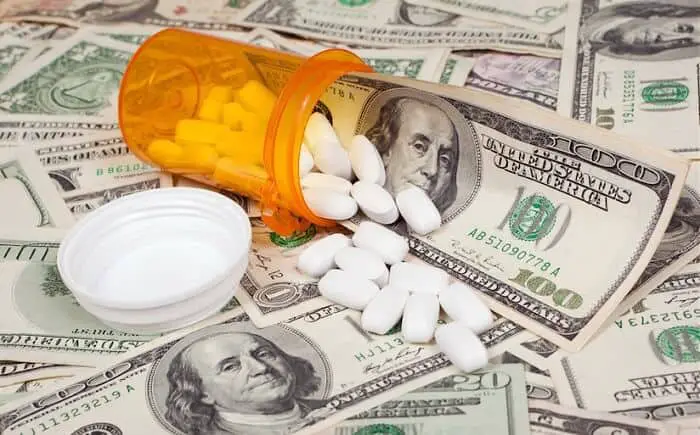Table of Contents
*This post may contain affiliate links. As an Amazon Associate we earn from qualifying purchases.
With drug costs on the rise, people with insurance providers that reduce their coverage of a particular dug can feel the pressure of paying for it. Even if you have a significant amount of insurance coverage, you may experience a high out-of-pocket cost. Follow our guide below on how to save money on prescriptions.
You can Save on Prescriptions If You…
Prescription medications are necessary for many to continue to live a normal, healthy life. However, because of the high prices, many people are not able to purchase the life-saving medicines that they need. Even with insurance, these prices can still be unmanageable. This can leave many in financial distress, debt, or simply ignoring their health concerns.
When trying to save money on your prescription medications, keep in mind all the factors that contribute to your final price. This includes your insurance plan, where your shop, and the drug you are using. Use the tips below to learn precisely how to save money on prescriptions in the future.
1. Talk to Your Doctor
Due to how our healthcare system was created, it’s difficult to comparison-shop. In fact, your doctor may not even know how much it may end up costing you for a prescription. However, it doesn’t mean that they still can’t give you a hand. It can be hard to admit to your physician that you have a tight budget, but it will you in the long run.
Can you believe that nearly one in five prescriptions are never actually filled? Not only does this drive doctors nuts, but it’s also a danger to your health. So, if there is a chance you won’t be able to afford the prescription, you should work with your doctor to find a better solution.
2. Compare some Insurance Plans
There’s no point in sticking with an insurance plan that doesn’t cover all your medications. Knowing this, you should be sure to take advantage of the open-enrollment season, which usually occurs during the fall, to compare a variety of insurance plans that you should get give a try. This is one of the best ways how to save money on prescriptions.
3. Comparison Shop
Compare prescription prices at retail stores, mail order, online, or in supermarkets. Different retailers sell prescriptions at different prices depending on your insurance and their policies. Often enough, you may also find discounts for ordering a month or two-month supply at a single time.
Additionally, you can also take full advantage of certain prescription discount programs, such as AAPR, which allow people to receive discounts on FDA-approved medications that aren’t covered by Medicare Part D and are filled by Walgreens. If you do choose to order your prescriptions online, make sure the website is VIPPS-certified and order your drugs at the same pharmacy to prevent risk-driven drug-to-drug interactions.
4. Use Coupons and Reward Programs
Often, drug manufacturers will offer discounts directly to consumers. They do so by offering coupons on the durgs that they make. Check the manufacturer website before heading down to your local pharmacy or shopping online. Additionally, some pharmacies have their own reward programs. These reward programs can give you discounts on all sorts of products including prescriptions.
5. Ask for Drug Samples
Another way how to save money on prescriptions is to ask for samples. Before you pay a hefty sum of money for a month’s worth of a prescribed drug, you should know if your body can handle it. If you’re planning on taking a brand-name drug, you should ask your doctor for 10 to 14 days’ worth of samples. Also, some manufacturers offer a free 30-day trial before the purchase of prescriptions.
6. Switch to Generic Drugs
If your doctor prescribed you a brand-name drug, you should ask if you can take a generic type instead. The cost of a generic drug is nearly 85 percent lower than their brand-name counterparts, according to the USDA.
7. Ask About Over-The-Counter Alternatives
In most instances, over-the-counter treatments work just as well as their prescription counterparts, but only a fraction of the cost. However, keep in mind that some health insurance plans don’t cover over-the-counter meds, so you may have to pay for them out-of-pocket. So, always compare the costs before deciding.
8. Review the Formulary
You should review your insurance’s formulary, which is a complete list of medications that are covered by your insurance. However, no two ingredients cost the same, which is why it’s so important to review their costs with your insurance provider.
When it’s time for your doctor to prescribe you a new drug, make sure you ask for other medication choices, to try and get a cheaper alternative. Also, keep your doctor in the loop that you’re looking for more affordable co-pays on your prescriptions, so they can be proactive about finding better choices for you.
9. Look For 90-day Prescriptions
It’s often cheaper and more convenient to purchase prescriptions in bulk as opposed to a shorter supply. Keeping this in mind, you should look for 90-day long-term prescriptions which are going to be cheaper than weekly or 30-day prescriptions. Be a frugal shopper when learning how to save money on prescriptions.
10. Get Extra Help
Some Medicare beneficiaries with insufficient resources and income can qualify for Extra Help, which is a government-funded program that helps seniors pay their Medicare prescription-drug plan, including deductibles, prescription co-payments, and premiums.
11. Use State Subsidy Programs
If you’re finding it hard to pay for out-of-pocket expenses, your state may offer subsidy programs that will help you pay for coverage not covered by Medicare. However, to see what’s available to you in your state, you should check on the Medicare site.
12. Properly Store Medicine
Though it might be contradictory to what you ordinarily would think, you should not store your prescriptions in the bathroom. Bathrooms are usually hot, steamy, and moist. In this kind of environment, medications can lose some of their potency which could render your expensive prescription useless. Instead, store your medicine in a cool, room temperature area.
Conclusion
The prices of prescription medications can often be high and unmanageable for many people. Insurance does not always help as much as you may need. However, you need your prescriptions to stay healthy. From shopping around to using government programs, you can locate and purchase affordable drugs that won’t break the bank.
If you have advice for other people, who are trying to save money on prescription medications? Let us know your thoughts on how to save money on prescriptions and your personal experiences in the comments below!
You might also like: How to Save Money on Braces?

